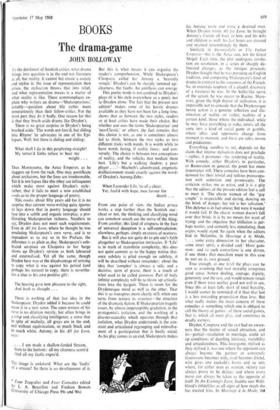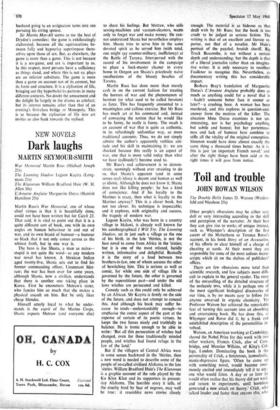The drama-game BOOKS
JOHN HOLLOWAY
To the detriment of bookish critics, what drama brings into question is in the end not literature at all, but reality. It cannot but create a society and stylise it; the issue of representation then arises, the stylisation throws that into relief, and what representation means is a matter of what reality is like. These commonplaces ex- plain why writers on drama—'Shakespearians,' notably—speculate about life rather more temerariously than their fellow-critics. For the most part they do it badly. One reason for this is that they brush aside drama like Dryden's.
There is no great surprise in Dryden's being brushed aside. 'The words not forc'd, but sliding into Rhyme' he advocates in one of his Epi- logues. Well, but there is sliding and sliding: What shall I do in this perplexing straight! My tortur'd limbs refuse to bear my weight . . .
Thus Montezuma, the Aztec Emperor, as he staggers up from the rack. One may pontificate about archaisms, but the lines are irredeemable. Yet it is not lapses like this (they are infrequent) which make most against Dryden's style: rather, that it fails to meet a now established credo as to the proper language of poetry.
This credo, about fifty years old (so it is no surprise that current verse-writing quite ignores it) lays down that in poetry language should fuse into a subtle and organic interplay, a pro- liferating Shakespearian richness. Needless to say, Dryden does not meet such requirements. Even in All for Love, where he thought he was emulating Shakespeare's own verse, and is so imprudent as to say so in his Preface, the difference is as plain as day. Shakespeare's cele- brated set-piece on Cleopatra in her barge shows up Dryden's version as both laboured and externalised. Yet all the same, though Dryden here was at the disadvantage of striving to copy what it was against his period (and perhaps his nature) to copy, there is neverthe- less a clue to his own positive gift :
The hearing gave new pleasure to the sight, And both to thought . . .
There is nothing of that last idea in the Shakespeare. Dryden added it because he could mean it in a new sense. The open texture of his verse is no dilution merely, but often brings in a crisp and classifying intelligence, a sense that In spite of multeity, all greys are in the end, and without equivocation, so much black and sn much white. Antony, in his All for Love, says:
• . . I am made a shallow-forded Stream, Seen to the bottom: all my clearness scorn'd And all my faults expos'd.
The image is awkward. What are the 'faults' of a stream? So there is no development of it.
Four Tragedies and Four Comedies edited by L. A. Beaurline and Fredson Bowers (University of Chicago Press 99s and 90s) But this is what means it can organise the reader's comprehension. While Shakespeare's Cleopatra called her Antony a 'heavenly mingle,' Dryden's can be sharply summed up : clearness, but faults. An antithesis can emerge.
This poetic mode is not confined to Dryden's plays (it is his style everywhere as a poet), nor to Dryden alone. The fact that the present new edition* makes some of his heroic dramas available as they have not been for a long time. shows that as between the two styles, readers or at least critics have made their choice. But whether one uses the terms 'Shakespearian' and `neo-Classic,' or others, the fact remains that this choice is not, as one is sometimes almost led to think, between the two styles as two different tricks with words. It is worth while to have words fusing, if reality fuses: and con- versely. The choice is between two conceptions of reality, and the vehicles that mediate them best. 'Life's but a walking shadow, a poor player . . .'—Macbeth's adumbrated, enigmatic disillusionment stands exactly against the words of Dryden's Aurung-Zebe : When I consider Life, 'tis all a cheat; Yet, fool'd with hope, men favour the deceit....
From one point of view, the Indian prince works a step further than the Scottish one: cheat or not, the thinking and classifying mind can somehow search out the nerve of the thing. From another, this kind of crispness irr the face of universal deception is a self-contradiction; elsewhere, perhaps, simply an excess of neatness.
But it will also not quite do to pin one's faith altogether to Shakespearian intricacies. If 'Life' is in truth of transfinite complexity, this does not quite commit us to the happy notion that. once subtlety is piled enough on subtlety, it will be described without remainder: about the idea that 'complex' is always a safe, and a decisive. term of praise, there is a touch of what used to be called gammon. Part of truly infinite complexity will be to throw up articula- tions into the bargain. There is room for the Drydenesque mind as well as the other. That this is so transpires more clearly still, when one turns from texture to structure—the structure of the dramatic fiction. If Shakespearian tragedy issues, by almost imperceptible gradation, in the protagonist's isolation, and the working of a disaster-causality which operates through that isolation, what Dryden understands is the con- stant and articulated regrouping and reinvolve- ment of a participation that is busily social. As his play comes to an end, Shakespeare makes his Antony more and more a deserted man. When Dryden wrote All for Love, he brought Antony's friends all back to him, and his wife and children as well; his last hours are stressed and strained unremittingly by them.
Similarly in A urung-Zebe or The Indian Emperor—this is the Aztec one, not the Great Mogul. Each time, the plot undergoes revolu- tion on revolution, in a series of sharply de- lineated changes. as the intrigue proceeds. Dryden thought that he was pursuing an English tradition, and composing Shakespeare's kind of drama in contrast to the sameness of the French. So, in externals (capture of a citadel, discovery of a treasure) he was. In the ballet-like nerve of the action, he was nearer 'to Racine. More- over, given the high decree of stylisation, it is impossible not to concede that the Drydenesque heroic action is a genuine reflection and illu- mination of reality—or rather, realities of a certain kind, those where the individual, while he may have everything at stake, enters all the same into a kind of social game or gamble, where allies and opponents change from moment to moment, and there are rules, moves and predictions.
Everything, needless to say, depends on the claim that intense stylisation does not preclude —rather, it promotes—the rendering of reality. With comedy, either Dryden's in particular, or Restoration in general, the point has more importance still. These comedies have been con- demned for their trivial and tedious preoccupa- tion with seduction and promiscuity. The criticism strikes me as naive, and it is a pity that the editors of the present edition feel a call to meet it. 'The chaste woman of the "gay couple" is respectable and daring, dancing on the brink of danger; her wit is her salvation.' This defence is in fact otiose; but were it needed it would fail. If the chaste woman doesn't fall over that brink, it is by no means for want of trying: and the objection that titillation is per- haps nastier, and certainly less stimulating, than orgies, would stand. So again when the editors find in Melantha, in Marriage a la Mode,
. . some extra dimension to her character, some inner spirit, a divided soul.' More gam- mon: and to such contortions is one driven, if one thinks that moralism must in this case be met on its own ground.
True enough, at one level the plays can be seen as assuming that real morality comprises good sense, honest dealing, courage, dignity, generosity and the rest, and would remain intact even if there were neither good nor evil in sex. Since this at least falls short of total banality, I would sooner be reminded of it than that lust is a less rewarding proposition than love. But what really makes the main concern of these comedies is something which one is obliged to call the theory of games : of those social games, that is, which all must play, and sometimes in deadly earnest.
Dryden, Congreve and the rest had an aware- ness that the matter of sexual attraction, and its—partial—resolution in marriage, could set up conditions of dazzling intricacy, variability and articulatedness. This love-game, stylised as they stylised it, was one where the opponent can always become the partner or conversely (inamorata becomes wife, rival becomes friend, wife gives one cuckold's horns and so on); where, for either man or woman, victory can always prove to be defeat; and where every move can always be taken as the opposite of itself. In An Evening's Love, Jacinta sees Wild- blood's infidelities as all signs of how much she has excited him. In Marriage a la Mode, tha husband going to an assignation turns into one pursuing his erring spouse.
Sir Martin Mar-All seems to me the best of Dryden's comedies: the game is exhilaratingly elaborated, because all the equivocations be- tween folly and hypocrisy superimpose them- selves upon those of sex. But, as elsewhere, the game is more than a game. This is not because it is a sex-game, and sex is important to us. In this respect, most persons have a sufficiency as things stand, and where this is not so, plays are an inferior substitute. The game is more than a game on account not of its content, but its form and structure. It is a stylisation of life, bringing out (by hyperbole) its patterns in many different contexts. No doubt the amusement and the delight lie largely in the drama as artefact; but its interest remains other than that of an evening's first-class bridge or Monopoly. This is so because the stylisation of life into art invites us also back towards the stylised.







































 Previous page
Previous page